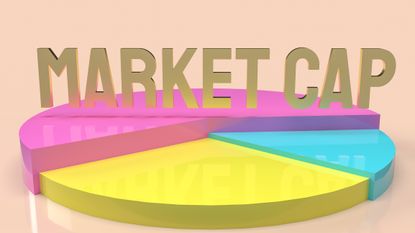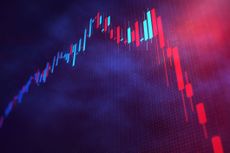What Is Market Cap?
What is market cap? Here we discuss the basics, significance and related issues of the metric that is often used to gauge a company's size and value.


One of the most common terms bandied about among investors is "market cap," which is also known as market capitalization or market value. But what is market cap?
In its most basic definition, market cap is equal to what a company is worth at any particular stock price.
To calculate a company's market cap, multiply the number of shares that are trading in the market and/or have been issued by the stock's current share price.

Sign up for Kiplinger’s Free E-Newsletters
Profit and prosper with the best of expert advice on investing, taxes, retirement, personal finance and more - straight to your e-mail.
Profit and prosper with the best of expert advice - straight to your e-mail.
So, for example, if a company has 10 million shares that are issued and outstanding (i.e., are not being held by the company as treasury stock) and the stock price is $10 per share, its market cap is $100 million. At $100 per share, its market cap is $1 billion.
What is market cap and what does it tell you?
Arguably, the biggest thing market cap tells you is what the stock market thinks a company is worth based on its price and the number of shares outstanding. This is also used to categorize its stock as mega cap, large cap, mid cap, small cap or micro cap. And knowing which bucket a stock falls into can help an investor determine a portion of the risk involved with owning those particular shares.
For instance, large- and mega-cap companies, or those with market caps that are typically above $10 billion and $200 billion, respectively, include many blue chip stocks that are considered some of the best long-term investments. This is because the firms are typically well-established with sound fundamentals.
Small-cap stocks, on the other hand, are companies with market caps that usually fall within the $250 million to $2 billion range. The share prices of these firms tend to be a bit more volatile than their larger-cap peers.
How is market cap calculated?
Most financial websites will tell you a company's market cap. However, even casual readers have probably noticed that not all sites have the same market cap number.
This is because they typically use diverse measures of a company's shares. For example, a precise market cap calculation cannot use the share count used in "earnings per share," or EPS. That is because this measure uses an average share count during the past quarter or year.
The most precise way to measure share count is to use the number of shares outstanding on the very first page of a company's most recent 10-Q filing. This can be found in the Securities and Exchange Commission's (SEC) EDGAR database.
A complicated market cap calculation, explained
CrowdStrike (CRWD) recently filed its 10-Q for the quarter ending July 2023. Note that on the bottom of the first page (before the table of contents) there is a sentence that reads, "As of August 15, 2023, the number of shares of the registrant's Class A common stock outstanding was 226,056,362, and the number of shares of the registrant's Class B common stock outstanding was 12,731,839."
This number is higher than the shares outstanding as of July 31, when CrowdStrike had 226,043,000 Class A shares and 12,732,000 Class B shares (as seen on its balance sheet).
So, between July 31 and August 15, the number of Class A shares grew by about 13,300. There were more Class B shares as well. This increase is likely due to options and restricted stock that have been exercised from shares issued to employees and consultants. Changes in the number of shares outstanding can also be due to stock buybacks, although in this case that is unlikely given that stock repurchases reduce shares outstanding.
So, in order to calculate the most precise market cap number, we add the number of Class A and Class B shares found in the August 15 10-Q and multiply that by CRWD's current share price ($163.89 as of the September 20 close). This works out to a market cap of $39.1 billion.
Note, that we have to add the most recent Class A and Class B shares, even though only the Class A shares are listed and trading on the Nasdaq. This is a common situation with tech stocks, including companies like Meta Platforms (META) and Alphabet (GOOGL). These firms have non-trading super-voting shares that are issued and outstanding, but they don't trade on the stock exchanges.
The bottom line on market cap
The bottom line is that the concept of market cap is useful for market analysts, traders and investors. It shows us exactly what the market thinks a company is worth based on its present trading price, and can help determine the level of risk involved with buying shares.
Related content

Mark R. Hake, CFA, is a Chartered Financial Analyst and entrepreneur. He has been writing on stocks for over six years and has also owned his own investment management and research firms focused on U.S. and international value stocks, for over 10 years. In addition, he worked on the buy side for investment firms, hedge funds, and investment divisions of insurance companies for the past 36 years. Lately, he is also working as Chief Strategy Officer for a tech start-up company, Foldstar Inc, based in Princeton, New Jersey.
-
 Instant EV Tax Rebates Are a Hit: $580M Paid This Year
Instant EV Tax Rebates Are a Hit: $580M Paid This YearEV Credits Claiming federal electric vehicle tax credits at the point of sale is a new and popular option in 2024.
By Kelley R. Taylor Published
-
 Seven Steps Couples Should Take Before Blending Their Finances
Seven Steps Couples Should Take Before Blending Their FinancesGetting on the same page now can ensure you remain successful throughout your relationship.
By Kiplinger Advisor Collective Published
-
 What Is Proxy Season and Should You Vote?
What Is Proxy Season and Should You Vote?Proxy season is upon us, allowing investors to weigh in on corporate leadership and policies. Here, we look at proxy season and whether you should vote.
By Kyle Woodley Published
-
 Stock Market Today: Stocks Swing Lower as March Jobs Report Looms
Stock Market Today: Stocks Swing Lower as March Jobs Report LoomsThe main indexes turned negative in mid-afternoon trading as all eyes turned to tomorrow morning's key employment update.
By Karee Venema Published
-
 What To Know About Alphabet's Rumored HubSpot Bid
What To Know About Alphabet's Rumored HubSpot BidAlphabet is talking to advisers about a possible takeover offer for HubSpot, according to media reports. Here's what you need to know.
By Joey Solitro Published
-
 Stock Market Today: Dow Sinks 396 Points as UnitedHealth Spirals
Stock Market Today: Dow Sinks 396 Points as UnitedHealth SpiralsLarge-cap healthcare stocks slumped after regulators set a disappointing reimbursement rate for Medicare Advantage plans.
By Karee Venema Published
-
 Stock Market Today: Stocks End Mixed To Start Q2
Stock Market Today: Stocks End Mixed To Start Q2Strong readings on the manufacturing data lowered expectations for a June rate cut and kept investors on edge.
By Karee Venema Published
-
 Q2 Investing Outlook: Experts Eye Earnings, Rate Cuts & More
Q2 Investing Outlook: Experts Eye Earnings, Rate Cuts & MoreInflation, interest rates and corporate earnings will be top of mind for investors in the second quarter.
By Karee Venema Published
-
 Stock Market Today: Stocks Close Higher After Nvidia's Reversal
Stock Market Today: Stocks Close Higher After Nvidia's ReversalThe main indexes erased early losses Tuesday as mega-cap tech stock Nvidia swung higher.
By Karee Venema Published
-
 Stock Market Today: Nasdaq Soars on Strength in Magnificent 7 Stocks
Stock Market Today: Nasdaq Soars on Strength in Magnificent 7 StocksThe main indexes started the week strong after several mega-cap stocks rallied.
By Karee Venema Published